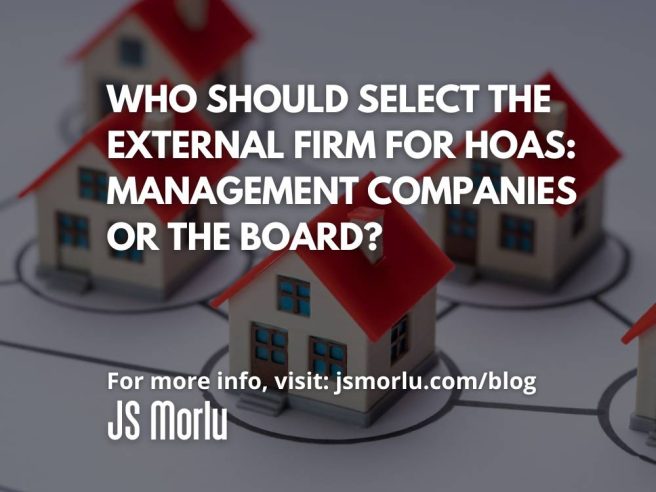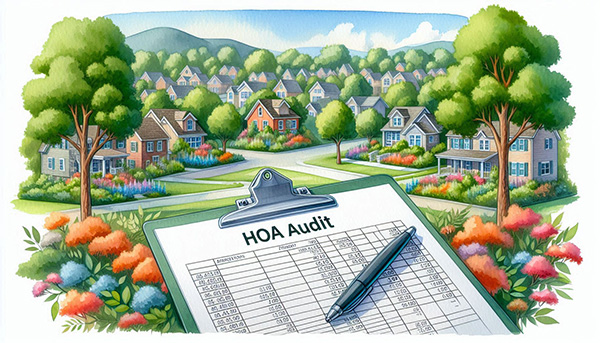By: John S. Morlu II, CPA
Homeowners Associations (HOAs) often rely on external audits or CPA reviews to ensure financial transparency, detect potential fraud, and maintain homeowner trust. But a key question arises: Who should be responsible for selecting the external audit or CPA firm—the HOA’s management company or the Board of Directors? This decision is more than administrative; it impacts the integrity of the audit process and the trust within the community.
This article explores the pros and cons of both approaches, supported by industry facts and insights, to help HOAs make an informed decision.
The Importance of External Audits for HOAs
External audits or CPA reviews are vital for HOAs to:
- Ensure financial accuracy and compliance with legal standards.
- Provide transparency to homeowners, fostering trust and accountability.
- Detect and deter fraud or financial mismanagement.
According to the Community Associations Institute (CAI), annual external audits are recommended for HOAs managing over $500,000 in annual revenues or with significant reserve funds. Whether legally required or voluntarily conducted, selecting the right CPA firm is critical for achieving these goals.
The Case for the Board Selecting the CPA Firm
1. Fiduciary Responsibility
The Board of Directors has a fiduciary duty to act in the best interests of the HOA. This includes overseeing financial management and ensuring the integrity of audits. By selecting the CPA firm themselves, the board maintains control and fulfills this responsibility.
Industry Fact:
A 2021 CAI survey found that 74% of HOA boards handle the selection of external audit firms, emphasizing their central role in financial oversight.
2. Avoiding Conflicts of Interest
Allowing the management company to choose the CPA firm could create a conflict of interest, especially if the same firm also audits the management company’s work. This situation risks undermining the independence of the audit.
Interesting Tidbit:
In one high-profile HOA case in Arizona, a CPA firm selected by the management company overlooked discrepancies in reserve fund reporting, later revealed to be intentional mismanagement by the management company. This oversight led to a legal battle between homeowners and the board.
3. Direct Accountability
When the board selects the CPA firm, they can ensure the firm is accountable directly to the HOA, not the management company. This arrangement helps maintain objectivity and transparency throughout the audit process.
The Case for the Management Company Selecting the CPA Firm
1. Professional Expertise
Management companies often work with multiple HOAs and have existing relationships with experienced CPA firms. Their industry knowledge and contacts can streamline the selection process and ensure the firm understands HOA-specific accounting needs.
Industry Fact:
HOA management companies typically work with CPA firms that specialize in community associations, ensuring compliance with IRS requirements, state laws, and financial best practices.
2. Efficiency
Outsourcing the selection process to the management company can save the board time, especially if board members lack financial expertise or familiarity with audit firms. The management company can provide a vetted shortlist of candidates for the board to approve.
Interesting Tidbit:
Some management companies include CPA firm selection as part of their service agreements, presenting it as a value-added service for the HOA.
3. Established Relationships
Management companies may already have strong working relationships with CPA firms, which can lead to smoother coordination during the audit process. However, this benefit must be balanced against the risk of conflicts of interest.
Best Practices for CPA Firm Selection
Regardless of who selects the CPA firm, HOAs should follow these best practices to ensure a fair and effective audit process:
1. Maintain Independence
The CPA firm should have no financial ties to the management company or board members to ensure unbiased reporting.
2. Use a Collaborative Approach
The management company can recommend CPA firms, but the final decision should rest with the board to maintain accountability.
3. Require Competitive Bidding
Solicit proposals from multiple CPA firms to compare qualifications, fees, and experience.
Interesting Tidbit:
According to HOA-USA, 38% of HOAs save 10-15% on audit costs by using competitive bidding processes.
4. Check HOA-Specific Experience
Ensure the selected CPA firm has experience auditing HOAs and understands unique considerations like reserve funds, dues, and IRS Form 1120-H compliance.
5. Review Engagement Terms
The engagement letter should clearly define the scope of the audit, including reporting requirements and timelines.
The Ideal Process: A Balanced Approach
A balanced approach ensures that both the management company and the board contribute to the CPA firm selection process:
1. The Management Company: Provides recommendations based on industry experience and existing relationships.
2. The Board: Reviews and approves the final selection to fulfill their fiduciary responsibility and ensure accountability.
This collaborative method leverages the management company’s expertise while maintaining the board’s oversight, reducing risks of conflicts of interest or poor audit quality.
Conclusion
The decision of who selects the external audit or CPA firm—management company or board—depends on the specific needs and dynamics of the HOA. However, maintaining independence, transparency, and accountability should always guide the process. By adopting best practices and fostering collaboration, HOAs can ensure that their audits are trustworthy, accurate, and beneficial to the entire community.
Final Tidbit:
Did you know that some states, like Florida and California, require external audits for HOAs above a certain revenue threshold? This highlights the importance of selecting a CPA firm with the expertise to navigate these legal requirements and deliver reliable results.
By making informed choices, HOAs can safeguard their finances, uphold transparency, and foster homeowner trust.
📖 Read next: Mastering HOA Finances: Best Practices for Financial Management
Author: John S. Morlu II, CPA
John S. Morlu II, CPA, is the CEO and Chief Strategist of JS Morlu, a globally acclaimed public accounting and management consulting powerhouse. With his visionary leadership, JS Morlu has redefined industries, pioneering cutting-edge technologies across B2B, B2C, P2P, and B2G landscapes.
The firm’s groundbreaking innovations include:
• ReckSoft (www.ReckSoft.com): AI-driven reconciliation software revolutionizing financial accuracy and efficiency.
• FinovatePro (www.FinovatePro.com): Advanced cloud accounting solutions empowering businesses to thrive in the digital age.
• Fixaars (www.fixaars.com): A global handyman platform reshaping service delivery and setting new benchmarks in convenience and reliability.
Under his strategic vision, JS Morlu continues to set the gold standard for technological excellence, efficiency, and transformative solutions.
JS Morlu LLC is a top-tier accounting firm based in Woodbridge, Virginia, with a team of highly experienced and qualified CPAs and business advisors. We are dedicated to providing comprehensive accounting, tax, and business advisory services to clients throughout the Washington, D.C. Metro Area and the surrounding regions. With over a decade of experience, we have cultivated a deep understanding of our clients’ needs and aspirations. We recognize that our clients seek more than just value-added accounting services; they seek a trusted partner who can guide them towards achieving their business goals and personal financial well-being.
Talk to us || What our clients says about us




